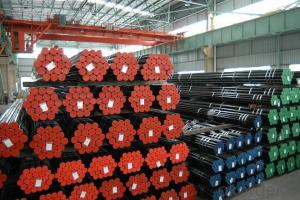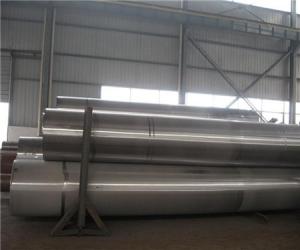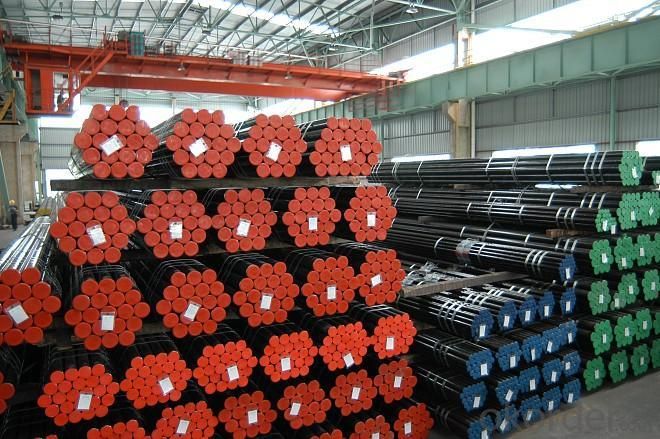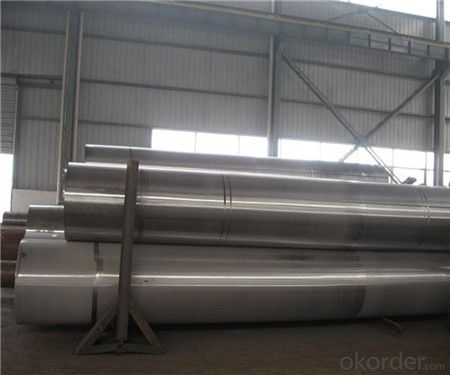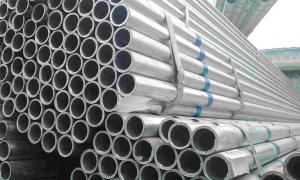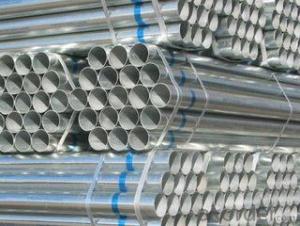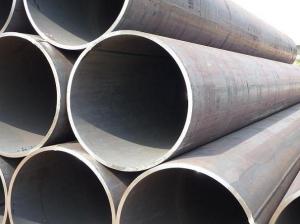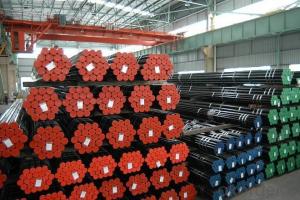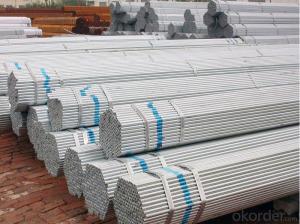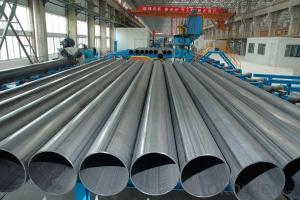Steel Pipe With Good Quality BS, JIS, GB, DIN, ASTM Schedule 40
- Loading Port:
- Tianjin
- Payment Terms:
- TT or LC
- Min Order Qty:
- 20 m.t.
- Supply Capability:
- 15000 m.t./month
OKorder Service Pledge
OKorder Financial Service
You Might Also Like
1、Structure of Steel Pipe With Good Quality BS, JIS, GB, DIN, ASTM Schedule 40:
Seamless pipe is formed by drawing a solid billet over a piercing rod to create the hollow shell. As the manufacturing process does not include any welding, seamless pipes are perceived to be stronger and more reliable. Historically seamless pipe was regarded as withstanding pressure better than other types, and was often more easily available than welded pipe.
2、Main Features of Steel Pipe With Good Quality BS, JIS, GB, DIN, ASTM Schedule 40:
• High manufacturing accuracy
• High strength
• Small inertia resistance
• Strong heat dissipation ability
• Good visual effect
• Reasonable price
3、Steel Pipe With Good Quality BS, JIS, GB, DIN, ASTM Schedule 40 Specification:
Standard | GB, DIN, ASTM ASTM A106-2006, ASTM A53-2007 |
Grade | 10#-45#, 16Mn 10#, 20#, 45#, 16Mn |
Thickness | 8 - 33 mm |
Section Shape | Round |
Outer Diameter | 133 - 219 mm |
Place of Origin | Shandong, China (Mainland) |
Secondary Or Not | Non-secondary |
Application | Hydraulic Pipe |
Technique | Cold Drawn |
Certification | API |
Surface Treatment | factory state or painted black |
Special Pipe | API Pipe |
Alloy Or Not | Non-alloy |
Length | 5-12M |
Outer Diameter | 21.3-610mm |
Grade | 20#, 45#, Q345, API J55, API K55, API L80, API N80, API P110, A53B |
Standard | ASME, ASTM |
1) Material:20#(ASTM A 106/A53 GRB.API5LGRB,GB),45#,16Mn,10#.
2) Specification range:OD:21.3-610mm,WT:6-70mm,length:6-12m or according to the requirement of clients.
3) Excutive standards:GB,ASME API5L.ASTM A 106/A53,Despite of the above standards,we can also supply seamless steel pipe with standard of DIN,JIS,and so on,and also develop new products according to the requirements of our clients!
4) Surface:black lacquered,varnish coating or galvanized.
5) Ends:Beveled or square cut,plastic capped,painted.
6) Packing:bundles wrapped with strong steel strip,seaworthy packing.
4、Packaging & Delivery
Packaging Details: | seaworthy package,bundles wrapped with strong steel strip |
Delivery Detail: | 15-30days after received 30%TT |
5、FAQ of Steel Pipe With Good Quality BS, JIS, GB, DIN, ASTM Schedule 40:
①How is the quality of your products?
Our products are manufactured strictly according to national and internaional standard, and we take a test
on every pipe before delivered out. If you want see our quality certifications and all kinds of testing report, please just ask us for it.
Guaranteed: If products’ quality don’t accord to discription as we give or the promise before you place order, we promise 100% refund.
②How about price?
Yes, we are factory and be able to give you lowest price below market one, and we have a policy that “ for saving time and absolutely honest business attitude, we quote as lowest as possible for any customer, and discount can be given according to quantity”,if you like bargain and factory price is not low enough as you think, just don’t waste your time.Please trust the quotation we would give you, it is professional one.
③Why should you chose us?
Chose happens because of quality, then price, We can give you both.Additionally, we can also offer professional products inquiry, products knowledge train(for agents), smooth goods delivery, exellent customer solution proposals.Our service formula: good quality+good price+good service=customer’s trust
SGS test is available, customer inspection before shipping is welcome, third party inspection is no problem.
6、Steel Pipe With Good Quality BS, JIS, GB, DIN, ASTM Schedule 40 Images:
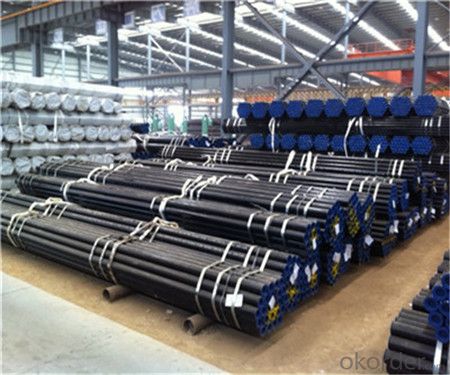
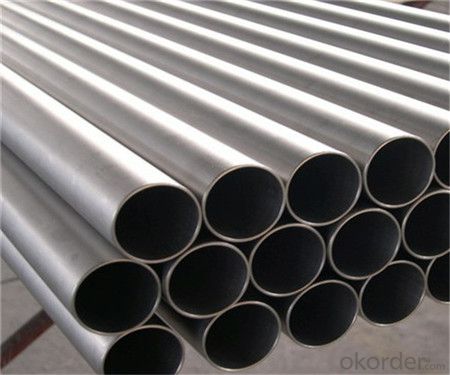
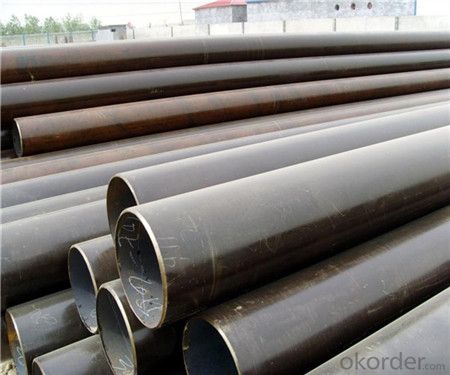
- Q: How are steel pipes used in the automotive manufacturing industry?
- Steel pipes are commonly used in the automotive manufacturing industry for various purposes such as exhaust systems, fuel lines, and structural components. They provide durability, strength, and resistance to high temperatures, making them ideal for these applications.
- Q: How to calculate the maximum bending stress of steel pipe? Is there a list of the maximum flexural normal stresses for steel pipes of different materials and diameters?
- The maximum flexural normal stress is calculated as: Sigma =M/ (gamma x*Wnx).Of which: M is the maximum bending moment of the steel tube;Gamma X - the plastic development coefficient of the cross section; for the cross section of the steel tube, 1.15,
- Q: What is the elasticity of steel pipes?
- The elasticity of steel pipes refers to their ability to deform under external forces and return to their original shape once the force is removed. Steel pipes are known for their high elasticity, which enables them to withstand various forms of stress and strain without permanent deformation. This property is crucial in applications where pipes are subjected to pressure, bending, or other mechanical forces. The elasticity of steel pipes is determined by the material properties of steel, such as its Young's modulus, which is a measure of its stiffness and ability to resist deformation.
- Q: How are steel pipes resistant to corrosion?
- The corrosion resistance of steel pipes is a result of several factors. Firstly, a protective layer, such as zinc or epoxy, is often applied to steel pipes. This layer acts as a barrier, preventing moisture and corrosive substances from reaching the steel and reducing the likelihood of corrosion. In addition, the composition of steel itself contributes to its resistance to corrosion. Steel is primarily composed of iron, with small amounts of other elements added to enhance its strength and durability. These additional elements, like chromium and nickel, create a natural oxide layer on the surface of the steel. This oxide layer acts as a protective shield, preventing moisture and oxygen from reaching the steel and causing corrosion. Furthermore, steel pipes can undergo a process called galvanization, where a layer of zinc is applied to the surface. This zinc coating provides an extra layer of protection against corrosion, as zinc is highly resistant to rust and oxidation. The zinc layer corrodes sacrificially instead of the steel, thereby extending the lifespan of the pipe. Overall, the combination of protective coatings, the composition of steel, and galvanization processes all contribute to the corrosion resistance of steel pipes. As a result, they are highly durable and suitable for a variety of applications, including plumbing, construction, and the transportation of fluids and gases.
- Q: How are steel pipes connected to other plumbing components?
- Steel pipes are commonly connected to other plumbing components through various methods, depending on the specific application and requirements. The most common methods of connecting steel pipes to other plumbing components include threading, welding, and using mechanical fittings. Threading is a process where the ends of the steel pipes are cut and grooves are created on the outer surface to form a threaded connection. This allows the pipes to be screwed into fittings such as elbows, tees, or couplings. Threaded connections are often used in smaller diameter pipes and low-pressure applications. Welding is another commonly used method to connect steel pipes. It involves heating the ends of the pipes and joining them together by melting the metal at the point of contact. This creates a strong and permanent connection. Welded connections are often used in larger diameter pipes and high-pressure applications. Mechanical fittings are another popular option for connecting steel pipes. These fittings are designed to be easily installed without the need for welding or threading. They typically consist of two parts – a compression ring and a nut. The compression ring is placed over the pipe, and the nut is tightened, compressing the ring onto the pipe and creating a secure connection. Mechanical fittings are commonly used in both residential and commercial plumbing systems. In addition to these methods, other connection techniques such as flanges, grooved couplings, and soldering can also be used to connect steel pipes to other plumbing components, depending on the specific needs of the system. Overall, the method used to connect steel pipes to other plumbing components depends on factors such as the size of the pipes, the pressure of the system, the type of fluid being transported, and the specific requirements of the project. It is important to choose the appropriate method and ensure that the connections are properly installed to ensure the integrity and efficiency of the plumbing system.
- Q: How are steel pipes used in the power generation sector?
- Steel pipes are commonly used in the power generation sector for various applications such as transporting water, steam, and other fluids within power plants. They are used for conveying high-pressure steam to drive turbines and generate electricity, as well as for transporting cooling water to regulate temperature in power plants. Additionally, steel pipes are used in the construction of power plant infrastructure, including the fabrication of boiler tubes, condenser tubes, and other critical components that ensure efficient and reliable power generation.
- Q: How are steel pipes used in data centers?
- Steel pipes are used in data centers for the purpose of housing and protecting the intricate network of cables and wires that transmit data. These pipes create a structured pathway for the cables, ensuring that they are organized, secure, and easily accessible for maintenance and upgrades. By using steel pipes, data centers can optimize their cable management, enhance airflow, and maintain a clean and organized environment for efficient data transmission and storage.
- Q: How do you protect steel pipes from rusting?
- To protect steel pipes from rusting, several methods can be employed. One common approach is to apply a protective coating to the pipes. This can be done by using paint or other types of protective coatings designed specifically for metal surfaces. The coating acts as a barrier between the steel and the elements, preventing moisture and oxygen from coming into contact with the metal and causing rust. Another method is to galvanize the steel pipes. Galvanizing involves coating the pipes with a layer of zinc, which creates a protective barrier that prevents rust from forming. This process is commonly used for outdoor applications or in environments where the pipes are exposed to moisture. Regular maintenance is also crucial in protecting steel pipes from rusting. This includes inspecting the pipes for any signs of corrosion or damage and promptly addressing any issues that are found. Additionally, keeping the pipes clean and dry can help prevent rust formation. In some cases, installing sacrificial anodes can provide additional protection against rust. Sacrificial anodes are made of a more reactive metal, such as zinc or magnesium, and are attached to the steel pipes. These anodes corrode instead of the steel, sacrificing themselves to protect the pipes from rust. Lastly, proper storage and handling of steel pipes is essential. This means storing them in a dry, well-ventilated area, away from moisture and humidity. It is also important to handle the pipes with care to avoid any scratches or damage to the protective coatings. By employing these methods and practices, steel pipes can be effectively protected from rusting, ensuring their longevity and durability.
- Q: Are steel pipes resistant to fire?
- Yes, steel pipes are generally highly resistant to fire due to their inherent fire-resistant properties.
- Q: Can stainless steel pipes spray black paint?
- Can. The surface roughening with a thick gauze, do not use ordinary paint intensity difference. With resin paint, paint can be
Send your message to us
Steel Pipe With Good Quality BS, JIS, GB, DIN, ASTM Schedule 40
- Loading Port:
- Tianjin
- Payment Terms:
- TT or LC
- Min Order Qty:
- 20 m.t.
- Supply Capability:
- 15000 m.t./month
OKorder Service Pledge
OKorder Financial Service
Similar products
Hot products
Hot Searches
Related keywords
